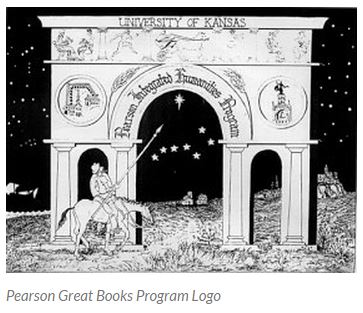 INTEGRATED HUMANITIES PROGRAM: A Definition
INTEGRATED HUMANITIES PROGRAM: A Definition
by John Senior
INTEGRATED means “united by a reason within the nature of the thing”, like a organism, rather than externally, like a collection, say of books in a library arranged for our convenience. A modern university is a collection of subjects loosely united by the demands of business and the professions for trained personnel and arranged for the convenience of its administrators. However, the great tradition in philosophy has held that knowledge is analogous, that is one integral structure having many parts but moving together and arranged from within by its intrinsic nature. To take an example: Business, according to Aristotle, is part of Ethics, or “practical” science, while it may be held by some economists that businessmen should be ethical, they do not define business itself as a way of being ethical so that the first consideration in developing the a resource or expanding trade must not be simply profit but the common good. And further, since “practical” means “doing,” it follows, according to the axiom, “operations are determined by the nature of the thing operating,” that Ethics is part of the more general knowledge of the nature of man, Psychology: and Psychology is a branch of Biology, the science of internally motivated moving natures; and Biology is really a kind of Physics, the science of moving natures in general; and Physics, finally, raises the largest questions of all in Metaphysics, the ultimate reasons for the existence of natures in the first place, the question of “being” in itself and its attributes, the Good, the True, the Beautiful. In an integrated program of studies every subject is seen in the light of each and all, and especially of these last three.
HUMANITIES means those aspects of integral knowledge directly bearing on the human species insofar as it is human-that is, insofar as man has intelligence, memory and will and the properties that follow from these faculties such as freedom, laughter, the enjoyment of poetry and the other arts, the appreciation of formal excellence in nature, workmanship or sports. The humanities are pre-scientific, based on ordinary experience.
 Some critics have accused humanities teachers of making fraudulent claims to encyclopedic knowledge how can one professor be an expert in so many fields? They ask and by the very question have tacitly and mistakenly assumed that all real knowledge must be specialized and that knowledge is the only end of education. Whereas in reality science simply makes common sense explicit, clear and detailed; and how can you clarify or formulate something you don’t already know? Science without the more general knowledge is pathetic, lost , like a surveyor who doesn’t know the lay of the land or a blind optician. Modern education has become increasingly suicidal in the encroachment of science on schools and liberal arts colleges where students traditionally have learned, through gymnastic and the imaginative arts poetry, music, history, nature study the love of these things, not their dissection and analysis. The purpose of the humanities is not knowledge but to humanize it is the indispensible prerequisite to science because the love of the subject is the motive and purpose of science. When that is lost, and the means taken as the end, humanity destroys itself, a victim of its instruments, according to the Marxist formula that all human activity is controlled by the “means of production.”
Some critics have accused humanities teachers of making fraudulent claims to encyclopedic knowledge how can one professor be an expert in so many fields? They ask and by the very question have tacitly and mistakenly assumed that all real knowledge must be specialized and that knowledge is the only end of education. Whereas in reality science simply makes common sense explicit, clear and detailed; and how can you clarify or formulate something you don’t already know? Science without the more general knowledge is pathetic, lost , like a surveyor who doesn’t know the lay of the land or a blind optician. Modern education has become increasingly suicidal in the encroachment of science on schools and liberal arts colleges where students traditionally have learned, through gymnastic and the imaginative arts poetry, music, history, nature study the love of these things, not their dissection and analysis. The purpose of the humanities is not knowledge but to humanize it is the indispensible prerequisite to science because the love of the subject is the motive and purpose of science. When that is lost, and the means taken as the end, humanity destroys itself, a victim of its instruments, according to the Marxist formula that all human activity is controlled by the “means of production.”
PROGRAM means “that which announces the main events”; it is equivalent to “agenda”. The word is properly used at theaters and prize fights, improperly by government agencies and universities to mean a “collection”, and artificial unification of activities. Some think education is “programming” in this improper sense; and when they don’t approve of the results, they institute “deprogramming” which proves that men lacking a humanistic foundation can depart so far from common sense as to verge on paranoia! If there is such a thing as human nature, since many generations have lived, the theater of life, as we might say, plays a long re-run whose “program” is familiar and strange as A Midsummer-Night’s Dream familiar because it is the story of our own lives, strange because we never wholly understand ourselves; life is a mystery. The Integrated Humanities Program is not a course, not the running through of a prescribed sequence in the humanistic sciences such a literary and historical analysis it is not an attempt to advance knowledge at all, but rather, as the word “program” in the proper sense implies, to read what the greatest minds of all generations have thought about what must be done if each man’s life is to be lived with intelligence, discretion and refinement.

